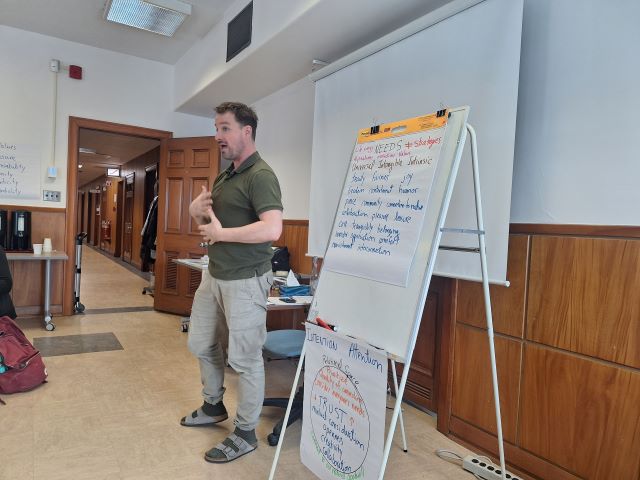Nonviolent Communication training supports educators, students

A few years ago, Danika Swanson, Personal Development and Community Involvement consultant at the English Montreal School Board (EMSB), received a special request from venture and Options outreach high schools: could she provide training in Nonviolent Communication (NVC)?
Swanson, who has a background in conflict resolution, turned to the communication process framework developed by psychologist Dr. Marshall Rosenberg. Non-violent communication, she explains, is “an approach to relationships that centres connection, empathy and collaboration.”
For her, the best way of integrating such an approach within a school was to create a space in which staff could learn from Rosenberg’s book Nonviolent Communications: A Language of Life.
Swanson launched an eight-week book club with educators from Venture and Options. Participants each had copies of Rosenberg’s book and met weekly to discuss it.
Caitlin O’Brien, a counsellor in re-education at the EMSB, was among them. She had previously heard about NVC and helped gather childcare workers, counsellors, and educators interested in learning together.
Once a group had been assembled, they began discussing Rosenberg's book, O’Brien explained.
“Danika just did a beautiful job of taking us through the book, chapter by chapter, with exercises and homework to do,” O’Brien said. “The approach […] helped us practice it in real time.”
Between sessions, participants tested new strategies in the classroom and at home, then returned to share their experiences. O’Brien recalls “tangible change” among the group and praised Swanson for creating “a learning environment where it was okay to learn and make mistakes.”
Encouraged by the response from participants, Swanson began to think about how to introduce and share NVC with more EMSB staff. She continued with the book club model, expanding the initiative to Perspectives High School, and sought grant funding to support the training for others in the EMSB. This funding allowed her to partner with Guillaume Lanctôt-Bédard, a certified NVC trainer from Spiralis, to offer in-depth workshops for two cohorts of EMSB professionals, teachers, staff and administrators to deepen their knowledge and capacity to share NVC.
Lanctôt-Bédard said he was met “with immense openness” and emphasized that willingness to learn is central to success with NVC. He also believes its value in schools is especially profound.
“I’m particularly moved when I get a chance to share [NVC] with people who have an impact on youth, whether they’re teachers or principals or educators, because I think that can really support creating an emotionally safe environment, where human beings can thrive and can have access to the best of themselves,” said Lanctôt-Bédard.









